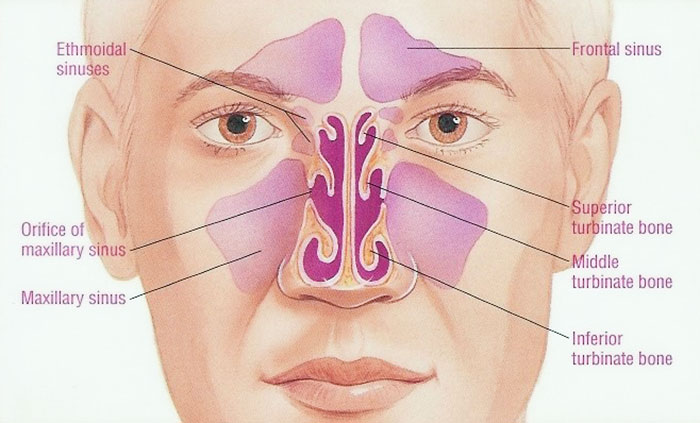What is sinusitis?
- Inflammation of one or more paranasal sinuses, the hollow air spaces within your skull surrounding your nose near your eyes and cheeks
- Majority of patients with recurrent sinusitis have allergies, causing shared symptoms of nasal swelling, increased production of mucus and difficulty with drainage
Signs and Symptoms
- Headache
- Face pain and pressure
- Prolonged discolored mucus drip from nose or down back of throat
- Stuffy nose
- Productive cough
- Fever
- Upper tooth pain
- Reduced sense of taste or smell
- Cough
- Asthma flare
- Fatigue
Types
Acute bacterial sinusitis
- Symptoms lasting less than four weeks
- Most often presents in adults with nasal congestion and drainage, postnasal drip, facial or dental pain and pressure, and cough – especially at night
- Usually presents in children with cough, runny nose and nasal congestion
- Often preceded by cold viruses that result in increased mucus and nasal passage swelling, which can trap mucus and air behind sinuses and cause bacteria to multiply and create infection
Chronic sinusitis
- Symptoms lasting longer than 12 weeks
- Most often occurs along with allergic rhinitis
- Should be reviewed in conjunction with allergy evaluation to determine most appropriate environmental control measures and other interventions
Sinusitis and Co-occuring Conditions
- Rhinitis (allergic and non-allergic)
- Cold virus
- Asthma
- Anatomic obstructions – nasal polyps, septal deviations, enlarged adenoids, foreign body, cleft palate, dental infection
- Gastroesophageal reflux (GERD)/Laryngopharyngeal reflux (LPR)
-
Systemic diseases (uncommon):
- Immune deficiency
- Ciliary dyskinesia
- Cystic fibrosis
- Aspirin allergy/sensitivity
- Air pollution
- Cigarette smoking
- Second-hand smoke exposure
Prevention
- Humidify air in your home, especially if heated by dry forced-air system. Central humidifiers should be set to 30-40% relative humidity.
- Avoid cigarette smoke and other air pollutants, especially if allergic. Inflammation caused by allergies can predispose you to strong reactions to irritants.
- Avoid chlorinated pools, which may irritate lining of nose and sinuses. Divers may experience increased congestion when water is forced into sinuses from nose.
- Short-term use of nasal decongestants before air travel may prevent blockage of sinuses or Eustachian tubes in ears.
- Allergy evaluation and allergy skin testing can help identify triggers that may cause sinusitis.
Treatment
Goals of treatment options are to improve nasal passage drainage, eliminate source of inflammation, reduce congestion and relieve pain. The following may be prescribed:
- Antibiotics (usually 10- to 14-day course for acute sinusitis and three-week or longer course for chronic sinusitis)
- Oral decongestants and/or topical nasal decongestant sprays (short-term use only for three to five days) to reduce congestion
- Saline sprays or irrigation systems to liquefy secretions
- High-dose guaifenesin to thin mucus and promote drainage
- Nasal steroids to reduce congestion, swelling and inflammation
- Oral steroids to relieve pressure, reduce inflammation and decrease pain – but only for a few days and only when other medicines are ineffective or symptoms are severe since they can have significant side effects
You may be referred to an ear, nose and throat (ENT) specialist if your sinusitis doesn’t respond to treatment. In some resistant cases, surgical intervention to remove diseased tissue, repair structural problems, and improve ventilation and sinus drainage may be recommended.

